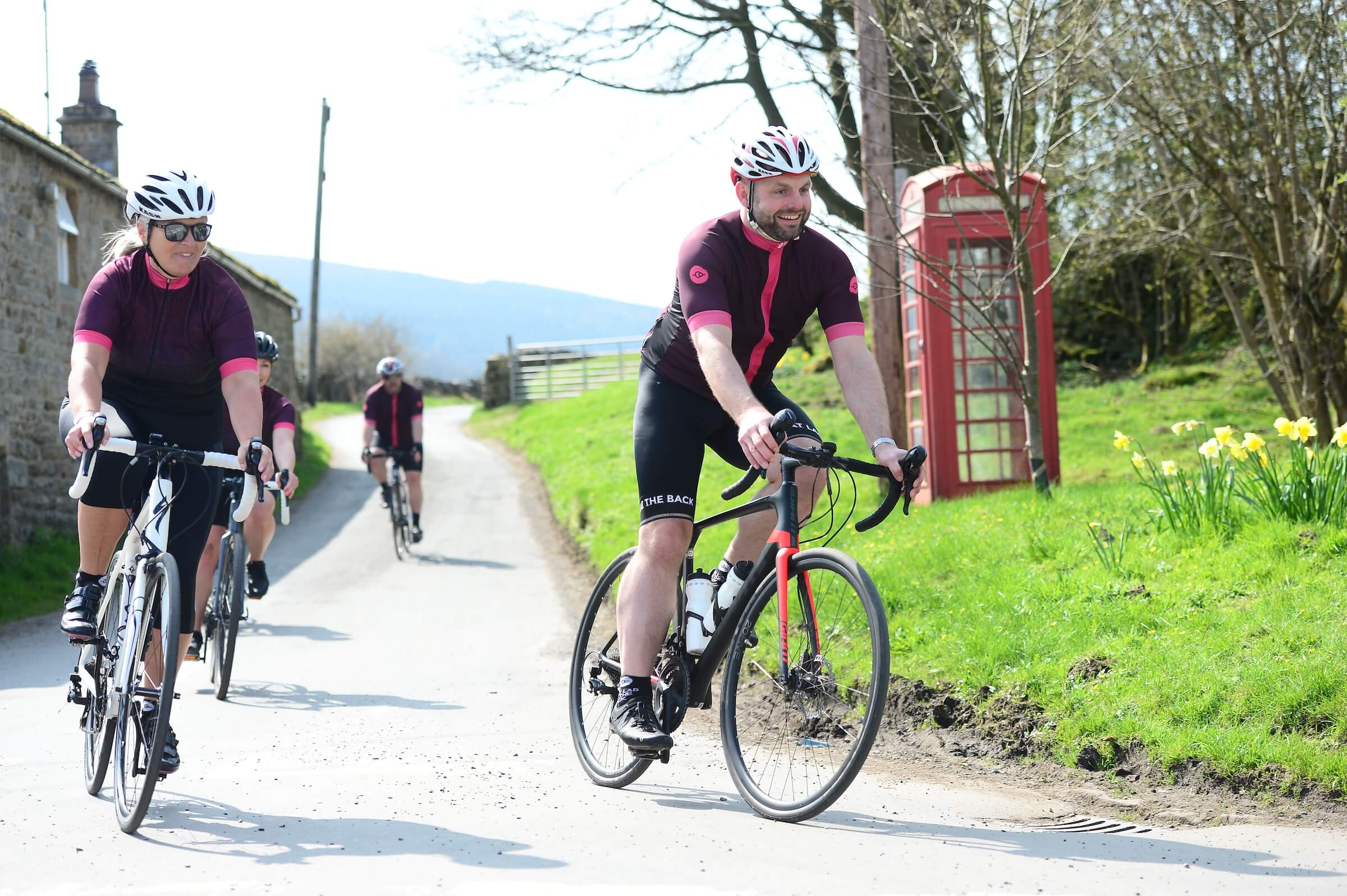In today’s fast-paced world, finding moments of peace and tranquility can feel like an elusive dream. The constant hustle and bustle, coupled with the pressures of modern life, can take a toll on our mental well-being.
However, what if we told you that the key to unlocking inner peace and reducing stress is as simple as hopping on a bicycle? Cycling has transcended its status as a mere means of transportation or a way to stay fit; it has emerged as an incredible tool for enhancing mental well-being.
In this article, we will explore the myriad of ways cycling can positively impact your mental health and provide insights into how you can embrace the power of cycling for stress reduction and emotional well-being.
The Connection Between Cycling and Mental Health

Cycling as a natural stress-reliever
In today’s fast-paced and increasingly demanding world, the need for effective stress-relief has never been greater. Many turn to various coping mechanisms, but few activities rival the natural stress-relieving power of cycling.
As you swing your leg over the saddle and grip the handlebars, a sense of freedom washes over you. The world outside the confines of your mind suddenly comes alive, and you embark on a journey where worries are left behind and the present moment takes center stage.
The rhythmic motion of pedaling serves as a powerful tool for calming the mind. As your feet push down on the pedals and the wheels turn beneath you, the repetitive movement becomes meditative.
The worries and anxieties that might have been plaguing your thoughts begin to dissipate, replaced by a sense of focus on the here and now. With each turn of the pedals, you embrace a new moment of clarity, giving your mind a much-needed respite from the relentless pressures of life.
Moreover, cycling takes you outdoors and exposes you to the beauty of nature. Whether it’s the lush greenery of a forest trail, the vast expanse of a coastline, or the picturesque countryside, the scenery provides a feast for the senses.
Breathing in the fresh air, feeling the warmth of the sun, and hearing the rustling leaves all work in harmony to soothe the mind and lift the spirit. Nature’s tranquility becomes a balm for your soul, offering a gentle escape from the noise and chaos of urban life.
The science behind cycling-induced endorphins
The joy of cycling is not just a fleeting emotion; it is a physiological response triggered by the release of endorphins in the brain. When you engage in physical activities like cycling, your body recognizes the exertion as a form of stress.
In response, it produces endorphins, often referred to as “feel-good hormones.” These endorphins serve as natural painkillers, reducing the perception of discomfort and fatigue while instilling a sense of euphoria and well-being.
As you pedal your way through challenging terrain or enjoy a leisurely ride through scenic landscapes, the level of endorphins in your brain rises. The more you immerse yourself in the activity and enjoy the experience, the greater the release of these pleasure-inducing neurotransmitters.
This “cyclist’s high” not only makes cycling enjoyable but also provides a powerful antidote to stress and anxiety. It’s the reason why a ride can leave you with a sense of elation, feeling like you’re on top of the world.

Cycling and its impact on neurotransmitters
The mental health benefits of cycling go beyond endorphins; it also involves a profound impact on neurotransmitters that influence mood and emotional well-being. Two critical neurotransmitters affected by cycling are serotonin and dopamine.
Serotonin, often referred to as the “happiness neurotransmitter,” plays a crucial role in regulating mood, sleep, and appetite. Engaging in regular cycling, particularly in outdoor settings, triggers an increase in serotonin production in the brain.
The combination of physical activity, exposure to natural light, and the joy of cycling contributes to enhanced levels of this neurotransmitter. As a result, you experience a more positive mood, reduced feelings of anxiety, and an increased sense of well-being.
Dopamine, known as the “reward neurotransmitter,” plays a key role in the brain’s pleasure and reward system. During cycling, particularly when you set and achieve goals or explore new territories, your brain releases dopamine in response to the sense of accomplishment and pleasure derived from the activity.
This reinforcement mechanism creates a positive association between cycling and feelings of reward and satisfaction, encouraging you to continue the activity. Cycling thus becomes a self-rewarding and motivating endeavor, amplifying its benefits for mental health.
Cycling and mindfulness: Finding peace on two wheels

Beyond its physical benefits, cycling provides a unique opportunity to disconnect from the constant demands of technology and immerse yourself in the present moment.
In a world where smartphones and screens dominate our attention, cycling offers a respite from the digital noise and a chance to be fully present without the distractions of technology.
When you embark on a cycling journey, your phone is safely tucked away in your back pocket or stashed in a bike bag, out of reach from the incessant pings of notifications.
This intentional separation from technology allows you to be truly present and engaged in the world around you. Instead of glancing at screens and responding to messages, you become attuned to the natural beauty that surrounds you—the vibrant colors of flowers, the soothing sounds of flowing water, and the gentle rustle of leaves in the wind.
Without the constant interruptions of calls, texts, or emails, your mind has the freedom to wander and explore. As you pedal along scenic paths or challenging terrains, your thoughts find a sense of clarity and focus.
The mental chatter that often accompanies our daily lives begins to subside, making way for moments of peaceful reflection and a heightened awareness of your inner thoughts and emotions.
Cycling becomes a sanctuary of solitude, a rare opportunity to escape the digital noise and reconnect with your own thoughts and feelings. In this screen-free environment, you rediscover the joy of being fully present in the moment and the simple pleasure of living without constant distractions.
Moreover, the absence of technology during cycling opens up opportunities for deeper connections with the natural world and with others. Instead of experiencing life through the lens of a screen, you engage your senses directly with the environment and the people around you.
You may strike up conversations with fellow cyclists, exchange smiles with passersby, or simply share a moment of camaraderie with nature.
In this state of technological detachment and mindfulness, the true essence of cycling shines through. It becomes not just a physical activity but a transformative experience—one that nurtures your mental well-being and allows you to find peace and solace in the world outside of screens and virtual connections.
Cycling Training and its Effects on Mental Resilience

The relationship between physical fitness and mental resilience
Cycling is not just a means of getting in shape; it is a powerful tool for cultivating mental resilience. As you embark on your cycling training journey, you’ll quickly realize that the benefits extend far beyond building strong leg muscles and cardiovascular endurance.
The process of setting and achieving cycling goals, along with the physical challenges you overcome, has a transformative impact on your mental well-being.
As you set out to conquer new trails or achieve longer distances, you are met with both physical and mental obstacles. Uphill climbs test your strength, while long rides challenge your endurance.
However, it’s during these moments of exertion that mental resilience takes center stage. When faced with difficulties, your determination and grit are put to the test.
As you push through these challenges and accomplish your cycling goals, a profound sense of accomplishment washes over you. Each conquered trail, each milestone achieved, boosts your self-esteem and confidence. This newfound self-assurance transcends the world of cycling and seeps into other areas of your life.
In your everyday challenges, whether it’s at work, in relationships, or personal pursuits, the mental strength cultivated during your cycling training journey empowers you to face obstacles with greater determination and resilience.
You learn to embrace difficulties as opportunities for growth and self-discovery. Cycling becomes a metaphor for life, teaching you that with dedication and perseverance, you can overcome any hurdle that comes your way.
Setting and achieving cycling goals for enhanced self-esteem
Cycling offers a dynamic platform for goal-setting and achievement, igniting a sense of purpose and focus in your life. Whether you’re a seasoned cyclist striving to improve your performance or a beginner aiming to conquer your first long-distance ride, setting cycling goals becomes a catalyst for your mental well-being.
The process of working towards these goals instills a renewed sense of purpose in your daily life. Each day becomes an opportunity to take steps towards achieving your cycling aspirations. You create a roadmap for success, outlining the training regimen, choosing routes, and setting milestones to mark your progress.
As you work towards your cycling goals, you’ll experience moments of triumph and breakthroughs. Completing a challenging trail that once seemed insurmountable or achieving a personal best in speed and endurance brings an immense sense of pride and accomplishment. Each victory fuels your self-esteem, reminding you of your capabilities and potential.
This heightened self-esteem permeates other aspects of your life, leading to a more positive outlook overall. You’ll find yourself approaching tasks and challenges with newfound confidence, secure in the knowledge that you can overcome any adversity.
The positive reinforcement from achieving cycling goals creates a self-perpetuating cycle of motivation and determination, empowering you to tackle life’s challenges with a renewed sense of vigor.

Group cycling and its social benefits
While cycling can be a solitary pursuit, joining a cycling group or club introduces an enriching social dimension to the activity. Beyond the joy of exploring new routes and sharing the thrill of the ride, group cycling offers invaluable social benefits that have a profound impact on your mental health.
Cycling with like-minded individuals fosters a sense of camaraderie and belonging. During group rides, conversations flow effortlessly, and laughter becomes the soundtrack of your journey. The shared passion for cycling creates an instant bond, making strangers feel like lifelong friends.
This sense of belonging and connection becomes a valuable support system during both the highs and lows of life. As you navigate the winding roads of life, knowing you have a group of friends to lean on provides comfort and reassurance.
During challenging times, the support of your cycling community becomes a beacon of light, reminding you that you are not alone in your struggles.
Moreover, the social aspect of group cycling acts as a stress-reliever in itself. Engaging in conversation and sharing experiences with others releases feel-good hormones in the brain, contributing to an overall sense of well-being and joy.
The support and camaraderie you experience during group rides enrich your cycling journey and elevate the mental health benefits of the activity.
Cycling Nutrition and Its Impact on Mental Well-Being

The role of balanced nutrition in supporting mental health
As the saying goes, “you are what you eat.” This adage holds true when it comes to mental well-being. To fully embrace and optimize the mental health benefits of cycling, it’s crucial to pay attention to your nutrition.
The food you consume provides the building blocks for both your body and mind, and a well-balanced diet tailored to a cyclist’s needs can play a significant role in promoting mental resilience and reducing stress.
When you’re out on your bike, conquering challenging trails or embarking on long rides, your body requires a steady supply of energy and nutrients to perform at its best.
A diet rich in a variety of nutrient-dense foods, such as whole grains, lean proteins, fruits, vegetables, and healthy fats, ensures that your body and mind are well-nourished to handle the physical and mental challenges that come your way.
Essential nutrients for mental health and performance
Certain nutrients stand out for their remarkable impact on supporting brain function and promoting positive moods. Omega-3 fatty acids, commonly found in fatty fish like salmon, flaxseeds, and walnuts, have been extensively studied for their benefits to the brain.
These healthy fats play a crucial role in maintaining the integrity of cell membranes in the brain, supporting cognitive function, and reducing symptoms of depression and anxiety.
Additionally, antioxidants found in colorful fruits and vegetables are like shields for the brain. They protect it from oxidative stress and inflammation, both of which can have damaging effects on mental health.
Berries, spinach, kale, and other vibrant produce are packed with these brain-boosting antioxidants. By incorporating these nutrient-rich foods into your regular diet, you not only enhance your physical performance but also give your mental well-being an extra boost.
As you fuel your body with the necessary nutrients, you create a solid foundation for resilience and emotional balance, complementing the positive effects of cycling on your mental health.

Cycling and its encouragement of healthier habits
Beyond the direct impact of nutrition on mental well-being, cycling often brings about positive lifestyle changes. Engaging in regular cycling can encourage you to adopt healthier habits that further support your mental health.
One of the notable changes is in alcohol consumption. When you’re passionate about cycling and committed to achieving your goals, you may find yourself reevaluating the frequency and quantity of alcohol intake.
Excessive alcohol consumption can interfere with your cycling performance, leaving you feeling lethargic and fatigued. As you prioritize your cycling endeavors, you might naturally find yourself opting for more moderate alcohol consumption or even abstaining from it altogether. This conscious choice can lead to better sleep quality and overall well-being.
Speaking of sleep, cycling’s impact on physical fatigue can translate into improved sleep patterns. After a rewarding ride, your body craves rest and rejuvenation. You’ll likely find yourself more inclined to go to bed early, eager to feel fresh and energized for your next cycling adventure or early morning ride.
Regular exercise, like cycling, has been shown to improve sleep quality, reducing the prevalence of insomnia and enhancing the overall duration of sleep. As sleep is closely linked to mental health and emotional stability, these improved sleep patterns can contribute to a greater sense of well-being and resilience.
FAQ About Cycling and Mental health
Can cycling really reduce stress and anxiety?
Absolutely! Cycling has garnered recognition as an effective stress-reduction activity. The rhythmic motion of pedaling, combined with the cardiovascular exercise, triggers the release of endorphins in the brain. These natural “feel-good” chemicals promote a sense of well-being and act as powerful stress-relievers.
Additionally, cycling allows you to shift your focus away from daily stressors, providing a temporary escape from worries and anxieties. The experience of being outdoors, surrounded by nature’s beauty, can further soothe the mind and contribute to a calmer state.
By incorporating cycling into your routine, you can witness a tangible reduction in stress and anxiety levels, leaving you with a more balanced and relaxed outlook on life.
Can cycling cure depression?
While cycling can be a beneficial tool for managing and improving mental health, it is essential to remember that it is not a cure for clinical depression. Depression is a complex and serious mental health condition that often requires a comprehensive approach to treatment, including therapy, medication, and support from healthcare professionals.
However, cycling has been shown to have positive effects on mental well-being, including reducing stress, improving mood, and increasing overall feelings of well-being. It can complement traditional treatments for depression and contribute to an overall healthier and more balanced lifestyle.
How often should I cycle to experience the mental health benefits?
The frequency of cycling required to experience mental health benefits can vary from person to person. Generally, engaging in cycling at least a few times a week can yield noticeable improvements in mood and stress levels.
However, the key is consistency. Regular cycling is more effective than sporadic rides in reaping the full mental health benefits. If you’re just starting, begin with shorter rides and gradually increase the frequency and duration as you feel more comfortable. The goal is to find a cycling routine that suits your lifestyle and allows you to maintain a sustainable practice.
Can group cycling help with social anxiety?
Yes, group cycling can be a valuable tool for addressing social anxiety. Joining a cycling group or club offers a supportive and understanding environment where like-minded individuals share a common passion for cycling. This shared interest creates an instant bond, making it easier to initiate conversations and build connections.
When cycling in a group, you typically interact with one person at a time, the individual riding beside you, which can make social interactions feel less overwhelming and more manageable.
The camaraderie and sense of belonging within the group can alleviate feelings of isolation and social discomfort. Moreover, the shared experience of cycling together fosters a sense of unity and mutual support, further reducing the anxiety associated with social interactions.
Engaging in group cycling can be a stepping stone to gradually overcoming social anxiety and developing meaningful social connections. As you become more comfortable and familiar with your cycling companions, the group dynamic can become a safe space for nurturing friendships and expanding your social circle.
How can I make my cycling experience more enjoyable?
To enhance your cycling experience, explore various ways to infuse joy and excitement into your rides. Experiment with different routes and explore new areas, discovering hidden gems and breathtaking landscapes.
Consider riding with friends or family members, transforming cycling into a shared adventure and bonding activity. Investing in quality cycling equipment and gadgets that can elevate your rides and keep you motivated.

